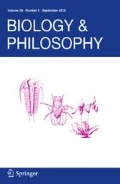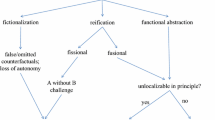Abstract
The Empiricist or Lockean view says natural kinds do not exist objectively in nature but are practical categories reflecting use of words. The Modern, Ostensive view says they do exist, and one can refer to such a kind by ostention and recursion, assuming his designation of it is related causally to the kind itself. However, this leads to a problem: Kinds are abstract repeatables, and it seems impossible that abstractions could have causal force. In defence of the Modern view, I suggest we can think of kinds as — or as like — ecological niches existing in nature, which are causally effective by virtue of the fact that they predictively determine (some) properties of the things that happen to occupy them.
Similar content being viewed by others
References
Attenborough, D.: 1979,Life on Earth: a Natural History, Little, Brown and Co., Boston and Toronto.
Ayers, M. R.: 1971, ‘Locke versus Aristotle on Natural Kinds’,Journal of Philosophy 78, 247–272.
Block, N., ed.: 1983,Readings in Philosophy of Psychology, Volume 1, Harvard University Press, Cambridge.
Boyd, R.: 1983, ‘Materialism without Reductionism: What Physicalism Does Not Entail’, in N. Block (ed.) 1983, pp. 67–106.
Burge, T.: 1982, ‘Other Bodies’, in A. Woodfield (ed.) 1982, pp. 97–120.
Chaitin, G. J.: 1988, ‘Randomness in Artithmetic’,Scientific American July, 80–85.
Churchland, P. M.: 1985, ‘Conceptual Progress and Word/World Relations: In Search of the Essence of Natural Kinds’,Canadian Journal of Philosophy 15, 1–17.
Davidson, D. and G. Harman, eds.: 1972,Semantics of Natural Language, Reidel Press, Dordrecht.
Descartes, R.: 1968,The Philosophical Works of Descartes, Volume 1, translated by Haldane and Ross, Cambridge University Press, New York.
Dobzhansky, T.: 1935, ‘A Critique of the Species Concept in Biology’,Philosophy of Science 2, 344–355.
Dobzhansky, T.: 1970,Genetics of the Evolutionary Process, Columbia University Press, New York.
Donnellan, K. S.: 1977, ‘Speaking of Nothing’, in S. P. Schwartz (ed.) 1977a, pp. 216–244.
Evans, G.: 1977, ‘The Causal Theory of Names’, in S. P. Schwartz (ed.) 1977a, pp. 192–215.
Fodor, J. A.: 1985, ‘Fodor's Guide to Mental Representation: the Intelligent Auntie's Vade-Mecum’,Mind 94, 76–100.
Fodor, J. A.: 1988,Psychosemantics: The Problem of Meaning in the Philosophy of Mind, MIT Press, Cambridge.
Ghiselin, M. T.: 1987, ‘Species Concepts, Individuality, and Objectivity’,Biology and Philosophy 2, 127–143.
Gould, S. J.: 1980a,The Panda's Thumb: More Reflections in Natural History, W. W. Norton and Co., New York and London.
Gould, S. J.: 1980b, ‘Sticking up for Marsupials’, in Gould 1980a, pp. 289–295.
Hanson, N. R.: 1958,Patterns of Discovery, Cambridge University Press, London and New York.
Hull, D. L.: 1987, ‘Genealogical Actors in Ecological Roles’,Biology and Philosophy 2, 168–184.
Hume, D.: 1739,A Treatise of Human Nature, L. A. Selby-Bigge (ed.), Clarendon Press, Oxford, 1960.
Kant, I.: 1781,Critique of Pure Reason, translated by N. K. Smith, Macmillan & Co., London, 1958.
Kitcher, P.: 1987, ‘Ghostly Whispers: Mayr, Ghiselin, and the “Philosophers” on the Ontological Status of Species’,Biology and Philosophy 2, 184–192.
Kripke, S. A.: 1971, ‘Identity and Necessity’, in M. K. Munitz (ed.) 1971, pp. 135–164.
Kripke, S. A.: 1972, ‘Naming and Necessity’, in D. Davidson and B. Harman (eds.) 1972, pp. 253–355.
Locke J.: 1690,Essay concerning Human Understanding, in two volumes, John Yolton (ed.), J.M. Dent & Sons Ltd., London and New York, 1967, 1968.
Mayr, E.: 1987, ‘The Ontological Status of Species: Scientific Progress and Philosophical Terminology’,Biology and Philosophy 2, 145–166.
Munitz, M. K., ed.: 1971,Identity and Individuation, New York University Press, New York.
Ockham, W. of: 1962,Philosophical Writings, selected, edited, and translated by Philotheus Boehner, Thomas Nelson and Sons Ltd., Edinburgh.
Putnam, H.: 1975a,Mind, Language and Reality: Philosophical Papers, Volume 2, Cambridge University Press, London and New York.
Putnam, H.: 1975b, ‘The Meaning of “Meaning”’, in H. Putnam 1975a, pp. 215–271.
Putnam, H.: 1977, ‘Is Semantics Possible?’ in S. P. Schwartz (ed.) 1977a, pp. 102–118.
Schwartz, S. P., ed.: 1977a,Naming, Necessity, and Natural Kinds, Cornell University Press, Ithaca and London.
Schwartz, S. P.: 1977b, ‘Introduction’, in S. P. Schwartz (ed.) 1977a, pp. 13–41.
Simpson, G. G.: 1961,Principles of Animal Taxonomy, Columbia University Press, New York.
Van Valen, L.: 1976, ‘Ecological Species, Multispecies, and Oaks’,Taxon 25, 233–239.
Wiggins, D.: 1980,Sameness and Substance, Harvard University Press, Cambridge.
Wiley, E. O.: 1980, ‘Is the Evolutionary Species Fiction? — A Consideration of Classes, Individuals, and Historical Entities’,Systematic Zoology 29, 76–80.
Wiley, E. O.: 1981a,Phylogenetics, Wiley, New York.
Wiley, E. O.: 1981b, ‘The Metaphysics of Individuality and its Consequences for Systematic Biology’,Behavioral and Brain Science 4, 302–303.
Woodfield, A., ed.: 1982,Thought and Object: Essays on Intentionality, Clarendon Press, Oxford.
Author information
Authors and Affiliations
Rights and permissions
About this article
Cite this article
Johnson, D.M. Can abstractions be causes?. Biol Philos 5, 63–77 (1990). https://doi.org/10.1007/BF02423833
Issue Date:
DOI: https://doi.org/10.1007/BF02423833




